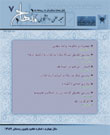فهرست مطالب

مجله منهاج
پیاپی 7 (پاییز و زمستان 1387)
- تاریخ انتشار: 1391/02/25
- تعداد عناوین: 8
-
-
صفحه 5
-
صفحه 7
-
صفحه 59
-
صفحه 101
-
صفحه 147
-
Page 7All Divine and human doctrines include arrangements for man's returning to a unique, peaceful life all over the universe. They mostly believe that the world and man will witness a universal revolution, and the whole world will be governed by a unique administration and leadership. This research work, discussing the possibility of the fulfillment of such a phenomenon from traditional and intellectual viewpoints, seeks to prove that firstly, the universe must end in a unique, world-wide rulership and government, and secondly, this universal government must be managed and controlled by a unique leadership, and this condition will only be fulfilled when the Savior of the human community, Mahdi the Promised (aj.), appears.Keywords: Hazrate Mahdi(aj), universal government, Islam
-
Page 27'Tolerance' is among the undeniable, common teachings of the Quran and the four Gospels. As a worthy principle, it has been both explained and practiced by the Prophet of Islam(s) and Jesus Christ(a.s.). Giving some examples of recommendation for tolerance in the Quran and the four Gospels, and comparatively examining the commonalities and differences in these two sources, this paper aims at vindicating tolerance in its own position, explaining this issue from the viewpoint of the Quran and the four Gospels, demonstrating the beautiful countenance of Islam and Christianity, and establishing rapport and peaceful coexistence among Muslims and Christians.Keywords: tolerance, the Glorious Quran, the four Gospels, personal rights, non, coreligionists, call to religion, debate
-
Page 59One of the essential debates in hadīth sciences is authentication of narrations with regard to their documentation and text. Identification of the fabricated hadīth and recognition of invalid narrations from sound ahadīth is the first step in examining and criticizing forged narrations. Al-Manar al-Monif is one of the works in this field which is regarded as a source for later books. Ebneh Ghayyem does not merely intend to introduce the forged narrations in this book, but he wants to present the rules and criteria on the basis of which one can recognize a forged hadīth. He believes that complete familiarity with authentic narrations and the Prophet's life story is necessary for authentication of the narrations attributed o him. Despite its advantages, this book needs to be seriously criticized. It has some problems pertaining to its form, structure, content, and the claimed rules which are briefly dealt with in this article.Keywords: al, Manar al Monif, Ebneh Ghayyem, forged ahadīth, exaggeration, vulgarity of words
-
Page 81Investigation of the hypocrisy movement, the function of the hypocrites, and the part they played in deviating Islam from its main route are among the important issues in the history of Islam. What may initially cross one's mind is that since Muslims and the Prophet's supporters were a small minority in Mecca and they had a weaker poison there, the hypocrisy phenomenon must have initiated after the Prophet's emigration to Medina, and this is what most of the Muslims, and even the interpreters and scholars agree with. Yet, examining the Quranic verses and pondering upon them reveal that hypocrisy had existed since the first years of the Prophetic Delegation. Some of these verses have been examined in this article.Keywords: hypocrisy, hypocrites, before emigration, Meccan verses
-
Page 101Existence of bonds of faith brotherhood among people is one of the features of a faithful community. For the first time, this kind of relationship was officially established among the Muslims by the Messenger of God. This relationship is of great significance to God, His Messengers(a.s.), and His infallible owliyā(a.s.). By virtue of this bond, the faithful are charged with some duties the fulfillment of which brings about blessings, and the negligence of which leads to chastisement in this world and in the Hereafter.Keywords: faith brotherhood, position, duties, blessing, chastisement due to negligence
-
Page 123Delineation of women's character and dignity is not only a scientific and research necessity, but also it is one of the scientific and social requirements of the present time. This article aims at examining women's dignity in Islam and Feminism. First, using the Quranic verses and narrations, woman's creation, the position of women in families, their righteousness and spirituality, and their economic independence are discussed. It is proved through this discussion that, like men, women are dignified human beings who can reach the loftiest stages of humanity. Then, feminism is defined and its goals and practical schemes are dealt with. It is concluded here that the schemes of feminism cannot fulfill the feminist's goals. Not only dont they lead women toward any real advantage, but they even weaken family relationships and shake the solidarity of families. Of course, this outlook enjoys some positive aspects among which we can refer to helping women gain economic independence, self-confidence, and the like in social arenas.Keywords: dignity, woman's character, rights, feminism
-
Page 147One of the bitter events in the history of the Shiite hadīth is the movement of hadīth fabricating exaggerators. Their hadīth forging has touched scholars so strongly that they have considered some of the rightly held beliefs and doctrines of the Twelvers as having been fabricated by the exaggerators. This article intends to deal with the factors the negligence of which will make the exaggerator's hadīth fabrication movement extremely influence the researcher's minds and will prevent people from accessing the sublime teachings of the infallible Imams.Keywords: Shiite hadīth, hyperbole, exaggerators, exaggerator's hadīth fabrication

